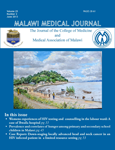
|
Malawi Medical Journal
College of Medicine, University of Malawi and Medical Association of Malawi
ISSN: 1995-7262
Vol. 30, No. 4, 2018, pp. 262-269
|
 Bioline Code: mm18052
Bioline Code: mm18052
Full paper language: English
Document type: Research Article
Document available free of charge
|
|
|
Malawi Medical Journal, Vol. 30, No. 4, 2018, pp. 262-269
| en |
Obsessive Compulsive Inventory – Child Version (OCI-CV): Confirmatory factor analysis, reliability, validity and correlates among Nigerian adolescents
Opakunle, Tolulope; Aloba, Olutayo & Akinsulore, Adesanmi
Abstract
Background
Obsessive compulsive symptoms (OCS) have not been studied among Nigerian adolescents, despite studies in developed countries
reporting that almost 90% of affected adolescents do not receive any treatment. The availability of a psychometrically valid and reliable
instrument will serve as an initial step towards the diagnosis and subsequent treatment of Nigerian adolescent obsessive compulsive
disorder (OCD).
Aims
The aim of this study was to examine the psychometric characteristics as well as correlates of the Obsessive Compulsive Inventory –
Child Version (OCI-CV) in a non-clinical sample of Nigerian adolescents.
Methods
This was a cross-sectional study involving 1017 adolescents who completed the Obsessive Compulsive Inventory-Child Version (OCICV),
the Hospital Anxiety and Depression Scale (HADS), General Health Questionnaire-12 (GHQ-12) and Rosenberg’s Self-Esteem
Scale (RSES). The model fit of the OCI-CV 6 factors was examined through confirmatory factor analysis. Reliability was determined by
calculating the McDonald’s Omega hierarchical (ωh) values while its concurrent validity was examined through correlational analyses.
Results
The overall internal consistency of the OCI-CV was 0.96. The indices of fitness obtained on subjecting the 21 items of the OCI-CV
to CFA indicated modestly acceptable indices of fitness despite satisfactory item loading on the 6 subscales. Statistically significant
correlations were observed between OCI-CV and the other study measures. OCS was reported by 37.8%.
Conclusion
The OCI-CV has exhibited satisfactory psychometric properties among Nigerian adolescents.
Keywords
Obsessive Compulsive Inventory–Child Version; Nigerian; adolescents; factor analysis; reliability; validity
|
| |
© Copyright 2018 - The College of Medicine and the Medical Association of Malawi
Alternative site location: http://revista.uft.edu.br/index.php/jbb/index
|
|
